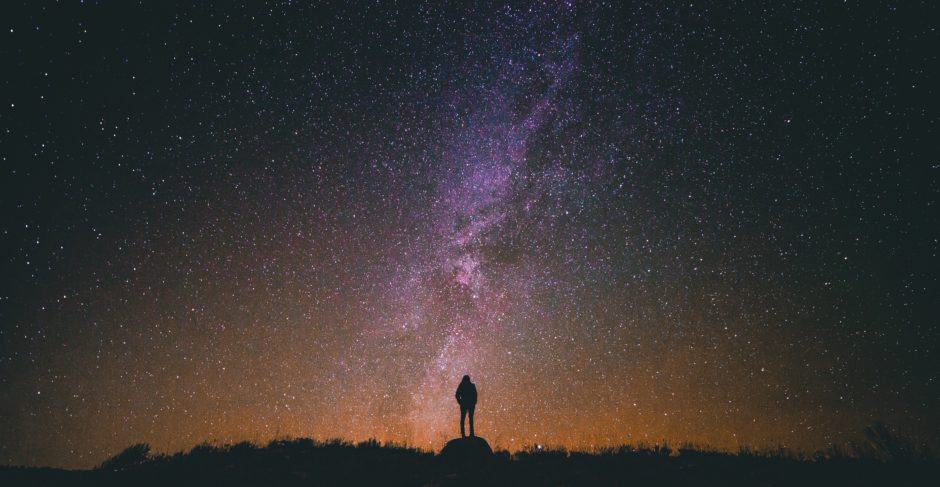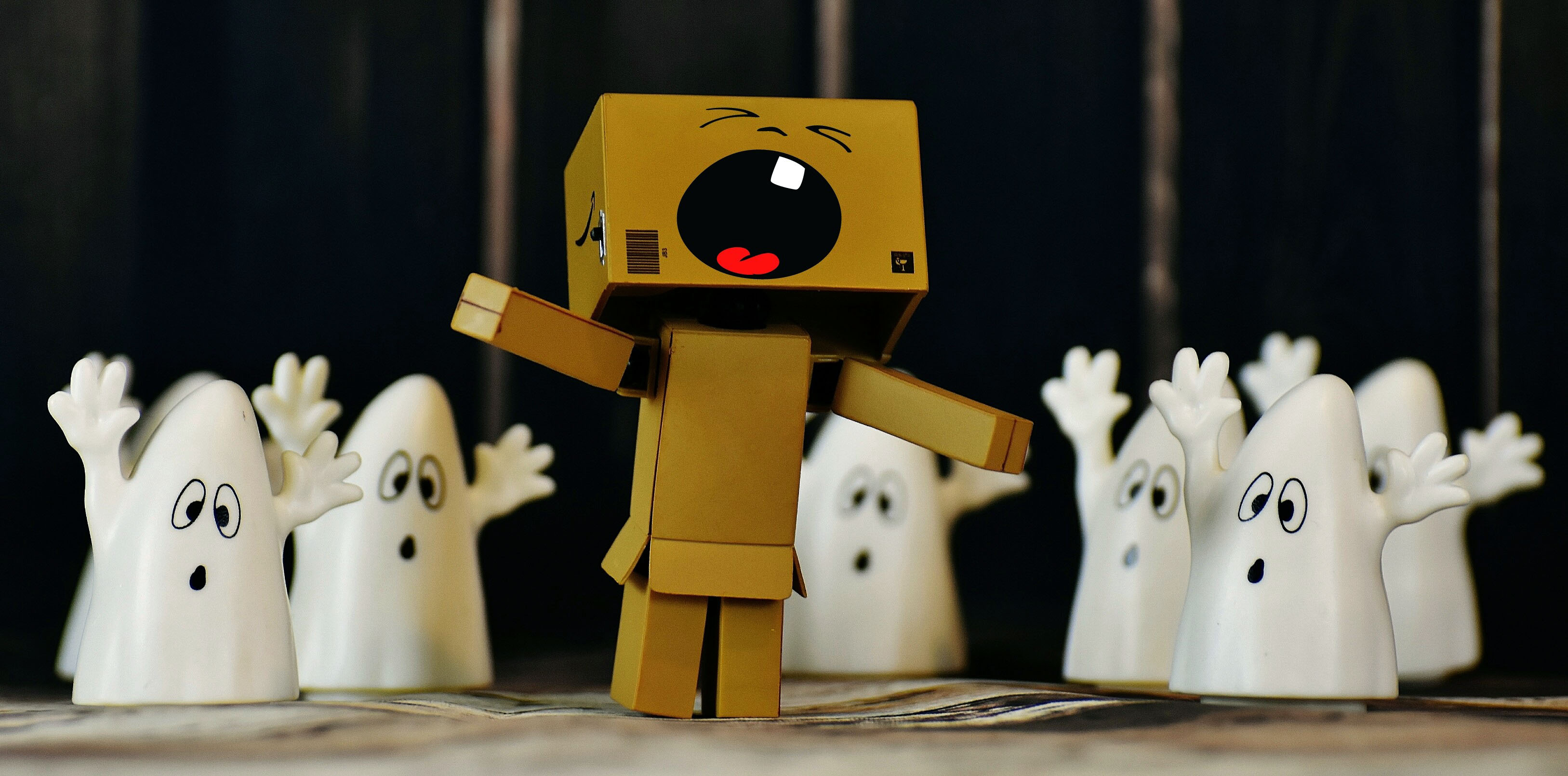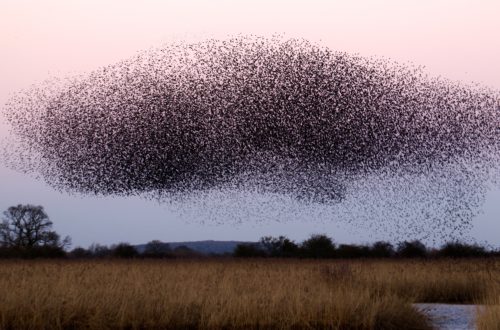When science journalist Sarah Scoles was working on a few articles for Wired magazine, she was assigned the task of following up on a 2017 New York Times piece about The Pentagon’s “shadowy” UFO investigation program. The program was originally founded as part of the Defense Intelligence Agency, according to the story, and for years officials had been studying unidentified objects and aircraft. Scoles’ editor asked if she wanted to go out and confirm—or not confirm—what the New York Times found. While she had written a book about the science behind the search for extraterrestrial intelligence, she had never reported on UFOs. Moved enough by the opportunity, she told her editor, “Sure,” thereby sealing her fate.
It was this astronomical moment that lead to Scoles’ immaculate conception of a book now being birthed onto store shelves today: They Are Already Here: UFO Culture and Why We See Saucers.
The book chronicles Scoles’ encounters with the UFO phenomenon and the people who devote their lives to it. She rockets through both the weirdest and most rational of claims—picking up a series of warped puzzle pieces that may never fit into a logical explanation.
As a journalist who has covered various fringe beliefs myself, I reached out to Scoles to learn about her experiences and research, wanting to compare notes. So we got on the phone and shot the breeze about UFO facts, fiction, and the fantasy of ever finding the whole truth.
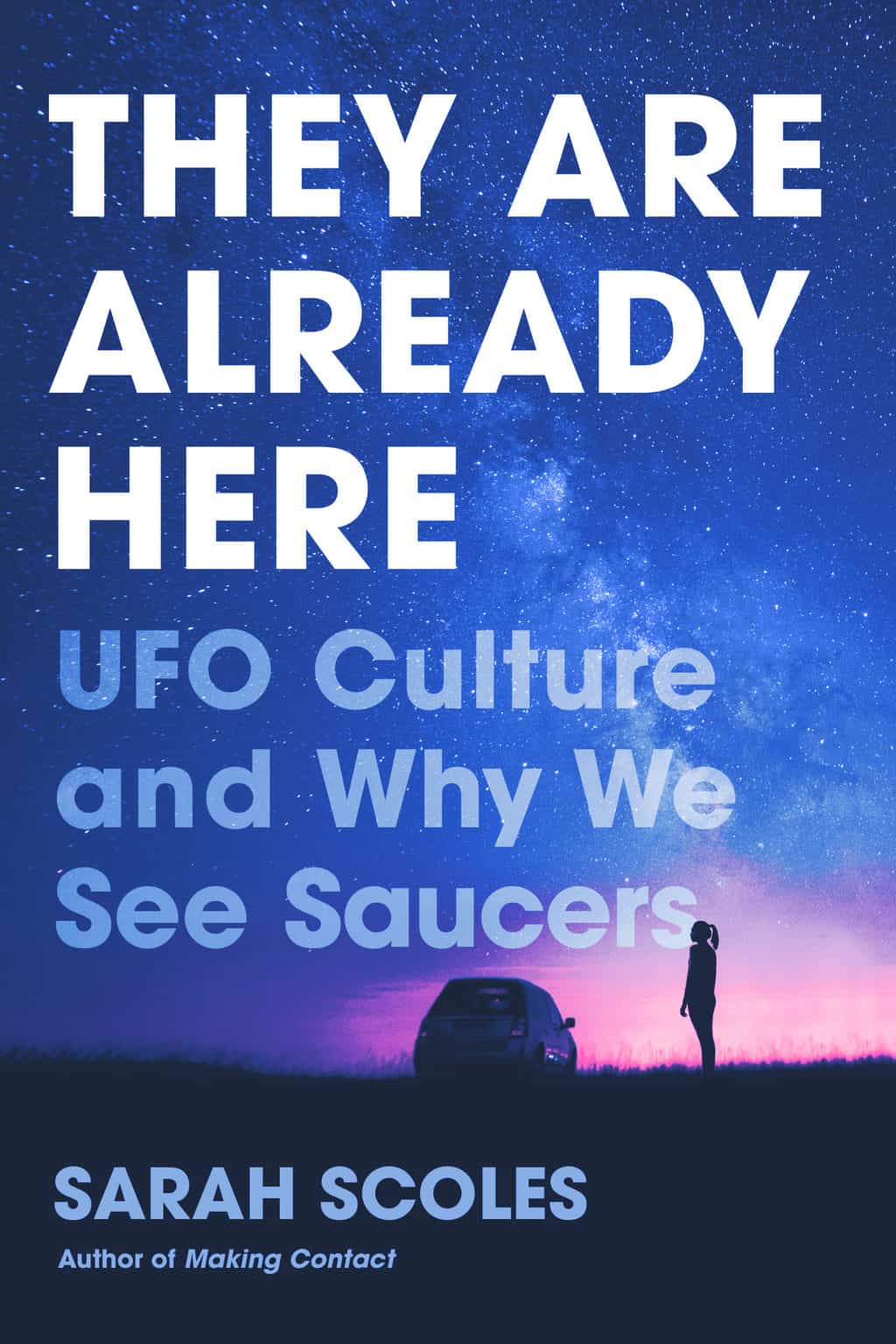
So why do we see saucers?
Whether they’re saucers or not, people do see things. The reason we see saucers goes back to the late 1940s, when the first modern UFO sighting occurred. There was a guy who saw a fleet of nine objects flying through Washington state and described them to a newspaper reporter as “skipping like saucers on water,” and that got mis-transcribed as “he saw flying saucers.” Since then that has given a lens to how people interpret the things they see in the sky. As time went on, people started to ascribe that technology to aliens or the government, depending on what era of time it was. People have a tendency to see things and interpret those things within the historical lens of what came before.
There’s no doubt that people see things in the sky that they can’t explain. Even if somebody else could explain what they saw—like a military commander or a scientist—people who see strange aircraft can’t explain what they see, which makes the aircraft a UFO to them. I think that’s indisputable.
What possessed you to write this book?
When I got the assignment from my Wired magazine editor to follow up on reports about The Pentagon’s alleged UFO investigation program, I had never reported on UFOs before. I had to go find the people who had been researching this for years and knew a lot more than I did.
Those people I met upended my ideas about who, for lack of a better term, “UFO-people,” are. Quite a few of them are very rational and do a lot of research and think critically. Previously, I’d had a biased view of who cared about UFOs. Learning I was wrong about them made me want to learn more about these researchers and what it was that compelled them to try to find the answers to the UFO question. I think that it was a good exercise.
Not to say that understanding each other will resolve all our problems and make everyone in America like each other. But I feel like it made me a more empathetic person. Other people might disagree with that. (laughs)
Let’s talk about flaps. To start, for anyone who happens upon this interview who isn’t in the know, what’s a flap?
A flap is a period of time where there are a bunch of UFO reports at once, where UFO sightings increase rapidly.
In the book, you also describe what social scientists call “perceptual contagions.”
Yeah. As soon as somebody calls to your notice that there might be something weird in the sky, you’re more likely to see something weird, and that’s what a perceptual contagion is.
Do you think perceptual contagions cause flaps?
I do. A modern example of this would be the Colorado drone mystery. This year in eastern Colorado, people reported that they were seeing unauthorized drones. No one knew where they were coming from, and they were buzzing by people’s houses. The Federal Aviation Administration and the Department of Defense were trying to figure out what the drones were, who was flying them and why there were so many of them. The ultimate conclusion they came to was that just one person saw unauthorized drones, then more people started to see them. After that, people started to look up at the sky more and notice, and they started to interpret spacecraft that weren’t unauthorized drones as unauthorized drones.
But you can’t actually prove any of that, right? That perceptual contagions were the cause of the sightings?
That’s true. Yeah, you can’t go back to the exact place and time that every person in Colorado said they saw those drones.
The perceptual contagion explanation seems a lot like mass hysteria, where an illusion of a threat makes people “imagine themselves into illness.” While it’s possible it was all in people’s heads, there’s no real evidence that’s true. To me, I’d rather the government just say they don’t know what happened. Perceptual contagions and mass hysteria seem like a cop-out.
I think a lot of people would agree with you. That’s been a criticism of a lot of federal conclusions about UFOs. Many official studies done in the 20th century like Project Blue Book, one of the most famous UFO investigation programs, are seen as cop-outs. In the past, it seemed that the government wanted to get the UFO issue off their plate, so they’d provide explanations that didn’t make sense.
Do you think that people are hallucinating UFOs and aliens?
I think some people are probably hallucinating aircraft or interpreting trauma through the lens of aliens, but I don’t think that accounts for everything that people see. I think people see things that they can’t explain. I don’t think it’s fair to totally rule out what they’re saying as something physical that no one can explain right now. But I also don’t think we have evidence that’s true. I don’t think that all people are hallucinating and I do think almost every person who reports a UFO sighting is doing it sincerely. They saw something or they believe they saw something.
While reading the book, I got the sense that you were a bit irreverent at times about the UFO-seeking community. Is that fair to say?
By irreverent, do you mean that I didn’t take all of it seriously?
Yes.
People in the UFO community use the phrase “UFO community,” but in reality, there is no one UFO community that believes all the same things. There are people who investigate UFO phenomena with various degrees of rigor, and they attempt to be scientific about it. Then, there are some that have ideas that I can’t really empathize with.
There are a spectrum of views, and I felt differently about the ones that were really grounded in research and the ones that weren’t. Eventually, I learned to regard certain types of researchers differently. I looked at the scientific arguments scientifically, and when it came to those with wilder beliefs, I examined those more like a religion than scientific research. I think that thought process helped me understand the latter’s perspective better.
UFO research is rife with conspiracy theories and false documents. How much fact-checking did you have to do on documents and claims? How much turned out to be bullshit?
All of the modern documentation referenced in the book was verified with the Department of Defense. Most of my book deals with real documents. I think there’s actually more information out there in historical archives that’s real and has come from the government than things that are outright hoaxed.
That said, I do talk a bit in the book about the Majestic 12 documents, which are about this group of elite people having discussions about all the aliens they have in hiding, briefing presidents and other officials on their findings. That has been proven to be an elaborate hoax.
Honestly, what’s more common than hoaxes is people taking real documents out of context and then using those to support their uninformed arguments and claims.
You talked to Christopher Rutkowski, a guy who conducts the Canadian UFO Survey, about how he had seen one UFO in the 70s, and his reaction to the sighting was, “Huh.” And that was it. What do you think has to happen for a “Huh” person to become a “UFOs are real!” person?
There are a lot of people who see strange things and then mostly forget about the experiences. And there are other people who see essentially the same things and it changes their lives forever. When people feel like they’ve interacted with a UFO, believe they’ve been abducted or think they’ve had personal contact with a mysterious aircraft, that seems to have a large effect on their jump from “Huh” to believer.
If you’re just seeing a light in the sky you can’t explain, the path from “Huh” to believer might have more to do with who you are as a person. If you’re feeling open to mystery or are at an emotional turning point in your life, then you’re probably more likely to draw UFO conclusions. If you’re wandering around in a total state of contentment, then maybe you’re more likely to dismiss a sighting as something interesting and move on.
There’s also a type of UFO sighting where people think that they can call UFOs to them and make them appear. They think that by manifesting their intention to see a UFO out in the universe, they can broadcast that somehow and have a UFO sighting. So anytime a person has a personal relationship with UFOs like that, they are more likely to believe it’s aliens.
Personally, I’ve seen various things in the sky that I couldn’t explain, and my personal response has been, “I don’t know what that is right now, but probably somebody does.” And then I mostly forget about it. When I wrote this book and started thinking about the sightings more, I started to pay more attention and think about what I was seeing in the sky far more than I had in the past. I guess maybe attention and emotion are the key factors in that mind shift.
Do you think that the government could be covering up UFO information?
I think in the past the government has shown that it handles UFO information pretty poorly. There’s a CIA historian’s report from the 90s that traces the government’s research in its attempts to convince the public that there’s nothing to see and they don’t need to worry about it. And the historian concludes that the way they did that, plus the secrecy surrounding it all, fostered conspiracy theories about it.
The government was hiding secret aircraft at Area 51. They also covered up what really crashed in Roswell, New Mexico—which turned out to be a nuclear detection device, not an alien spaceship.
Because the government has covered up things related to what people thought were UFOs, it’s not unreasonable for people to think they’re still hiding UFO information right now. The government has always treated the topic with secrecy. Do I think the government has an alien spaceship stashed somewhere? I do not. But I think the government is more interested in unauthorized and unidentified spacecrafts than they’d like the general public to think.
Why wouldn’t they want us to know?
In the 1960s, the government created the Robertson panel. It focused on how the general populous would react to the idea of mysterious spacecraft, possibly from outer space. They surmised that if people believed in alien UFOs, it could lead to panic, clog national security channels and send society into chaos.
In the past, the government hasn’t wanted us to think there’s anything to this UFO phenomenon, probably because there isn’t something to the phenomenon. But also, the government has been concerned that the potential panic about UFO sightings would distract them from other pressing things they’re trying to achieve.
So it’s possible that the government doesn’t want to be distracted by people’s UFO fear or overreactions. But what do you think about the theory that UFO information is released in the media in order to distract the public from what the government is actually doing?
Yeah. That has happened with research going on in the mid-20th century with Area 51. There’s a lot of evidence that the government did let UFO conspiracies go on, and perhaps fostered them a bit. The thinking was, if somebody said, “Oh, I saw this crazy thing in the sky,” then everyone would think it was an alien spaceship, and be distracted from thinking it was actually a super secret military aircraft.
In May of last year, the New York Times reported that Navy pilots saw UFOs. Why do you think the Navy pilots are coming forward with this information now?
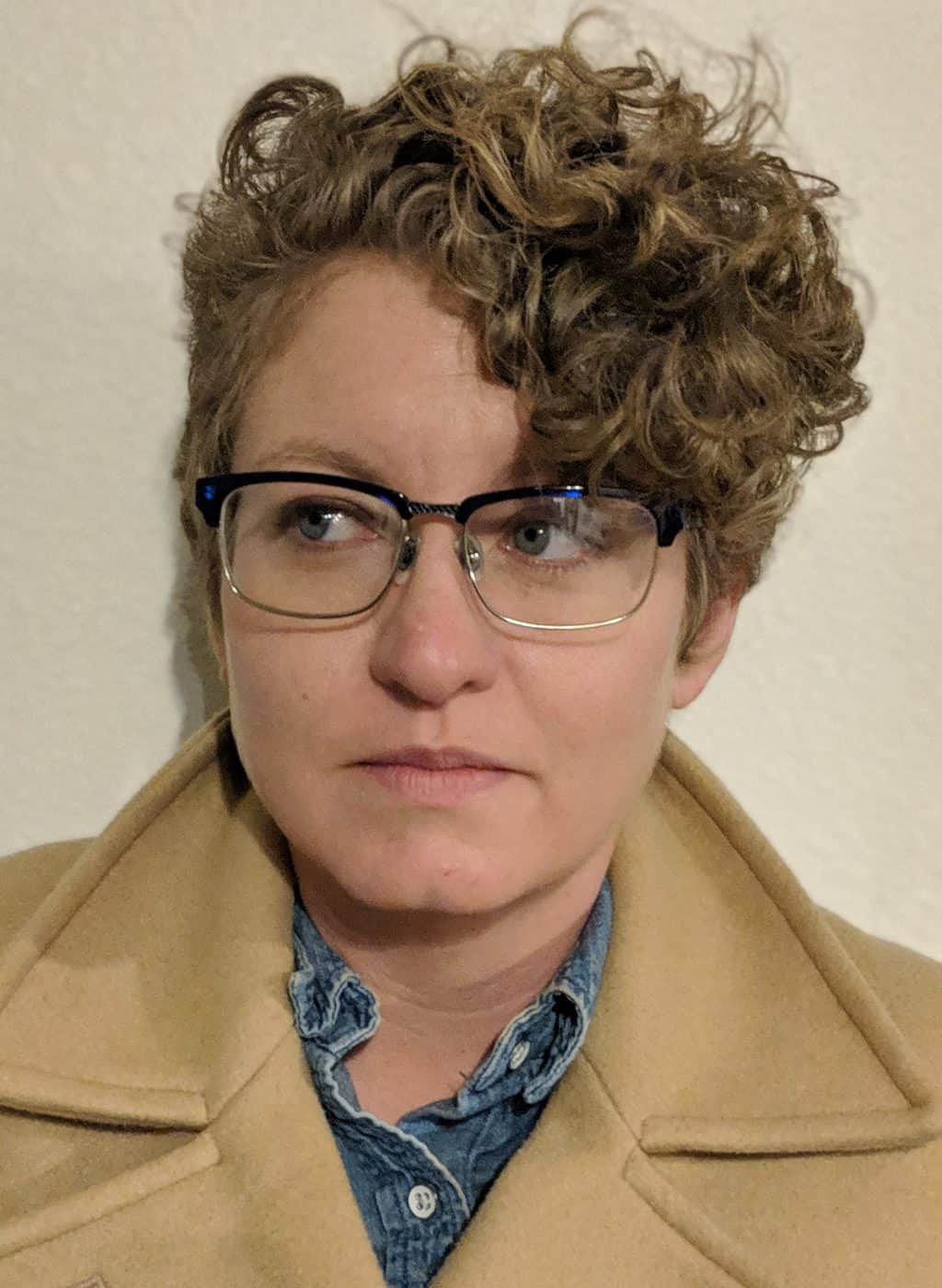
What’s brought these Navy pilots out of the woodwork is an organization called To the Stars Academy of Arts and Science, which is headed by the former frontman of the band Blink-182, Tom Delonge. The organization has collected these people associated with past military sightings and military programs, brought them together and helped them get these stories out into the mainstream media. So from a really practical perspective, I think that’s why it’s happening now. This company has given people a platform.
Some have theorized that the government is finally trickling UFO information out because they’re readying us for inevitable alien contact. What do you think about that assertion?
I don’t see a ton of evidence that the military is readying us for disclosure of alien contact. However, historically, it’s been in the government’s interest to showcase its own capabilities to foreign countries or people who might be threatened or interested in American research. The U.S. makes enough information available to make people wonder what the country is capable of.
I do wonder if the government has an interest in either saying they can detect these sorts of advanced aircraft or if they’re actually developing these kinds of advanced aircraft.
So the strategy is to use scare tactics?
Yeah. That’s a more succinct way to put it.
You go on quite a few adventures in this book. Are there any that were particularly surprising, or that you still think about at this very moment?
One experience that I think about the most is the trip I took to Area 51. I went with my sister and a friend and as soon as we got near the base we started to see what turned out to be flare exercises—where jets are chasing each other and dropping flares as part of a military exercise. But it looked exactly like a flying saucer. Later in the night, we saw something we couldn’t explain: a matrix of bright dots in the sky moving in unison, taking up a quarter of the whole sky. We don’t know what was.
I think that it was probably military technology. But it was so cool and so fascinating to see something I couldn’t explain, something that someone was developing that I didn’t have access to and have no way to find information about. I liked the whole mystery and the scavenger hunt of sitting outside, watching the sky and looking for weird things all night. It’s one of my new favorite memories, and I feel like that’s what people who research UFOs are chasing after: a mystery they can never solve. I want to go back to Area 51 to see more!
You talk a lot about how UFOlogy is a religion. What do you think defines a religion?
For me, what defines a religion at its core is that it involves a belief and a faith that you don’t have the evidence to support, and that you don’t need evidence to support. You have seen something you know is real and you don’t need somebody to find a piece of metal from a spacecraft to prove it. Another strong aspect of religion is the idea that there is some higher power, whether that’s a god or an alien, that has some effect on the world.
Do you think that science can function as its own religion?
I do. I don’t think it always does, and I don’t think it’s supposed to. But I think there are definitely times when science and scientists are dogmatic, hanging onto their own ideas about things even when there’s evidence to the contrary. They can hold up science as a higher power the way other people hold up God. I think when people look to science for total certainty, that’s a lot like a religion, because most of science isn’t totally certain and a lot of the things in textbooks we think are true now are going to be proven wrong later. So when you think of science as this absolute truth, it’s a lot like a religion.
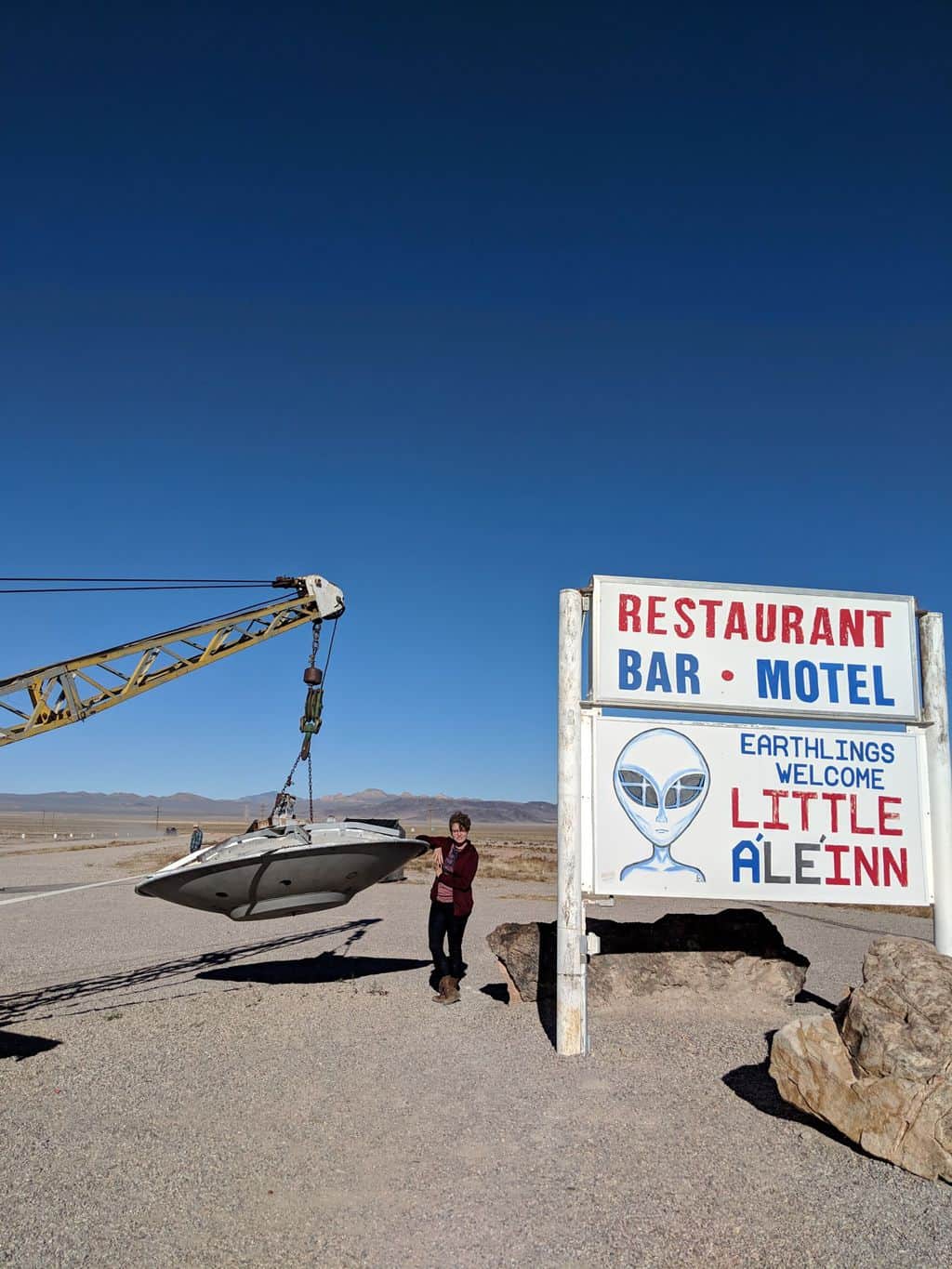
When you visited the International UFO Congress conference, you said that you wanted to tell everyone that you weren’t a believer. As a journalist reporting on the Bigfoot phenomenon, I’ve been to conferences before where I’ve had the same urge. Where do you think that desire comes from?
I think if a therapist were to analyze me, she’d say that the desire comes from a place of superiority. Subconsciously, I think I wanted UFO believers to know that my thoughts on something were “better” than theirs, even though I don’t consciously think that.
I grew up very religious, and I withdrew from it as I got older. I’ve had an extreme aversion to anyone thinking I believed anything after I left religion.
Why did you have the urge to tell people you didn’t believe?
I didn’t want people to assume that I was illogical, so I felt the need to defend myself. I’ve shifted perspective since. I used to be really hard-nosed about scientific studies and hard on people who didn’t share my mindset. I used to think that facts were facts just because they were written down. As I’ve gotten older and realized how much I’m being lied to on a regular basis, that changed.
Yeah. What I’ve learned in journalism is never trust anyone about anything. Humans aren’t always good at knowing ourselves, and scientists also are bad at thinking they’re being objective and they think they’re interpreting evidence through some magical objective lens. But they’re actually interpreting everything through their own biases and experiences like everybody else.
As journalists, we’re taught to remain as unattached as possible to get the most accurate story. Do you think journalists are people who are taught to fear their own beliefs?
They’re taught to fear talking about their own beliefs publicly and that can translate to fearing their beliefs in actuality. That’s part of why I decided to put myself in this book: I knew that I did have an opinion about UFOs and UFO culture. One of the things I’d like to think about myself is that I’m willing to change my mind in the face of new evidence, and I wanted to be honest about that in the book. So when you can’t have that magical “objective” viewpoint as a journalist, it’s best to be totally honest about where you’re coming from rather than just trying to hide it—and then being prepared to back it up with actual reporting. I didn’t want to pretend I didn’t have a stake in what I was reporting on.
At one point, you say, “We will never truly understand the state of our world and our place in it.” Why bother being a journalist then if you have no hope? Why ask questions?
You can get incrementally closer to parts of the truth all the time and understand a portion of the whole. I think that’s valuable, even if you’re never going to get the full picture.
Journalism is a way for me to ask questions and try to answer them, and at least get a sense of things. I guess probably if we were going to consult a therapist on this, she’d probably say that it’s a way to have a measure of control over the world. If I feel like I can understand some part of it and I’m doing the work of figuring it out, that’s some tiny bit of command over the universe that I didn’t have before.
Sounds like what UFO-seekers are searching for.
Definitely. When you feel that there are greater forces outside of your control, dictating the narrative of your life—whether it’s the government or alien invaders—then unraveling the conspiracy can be freeing. You can take the power back.
This interview has been edited for length and clarity.

